Our Sacred Honor (A Luke Stone Thriller—Book 6) Read online
Page 5
“What are you saying, Kurt?” Susan said. “Just say it.”
“Iran could build and test nuclear weapons,” Kurt said. “And we might not find out about it.”
Instantly, an idea occurred to Luke. It was just one of those things. There is a question, and your mind spits out the answer. You don’t have to like the answer, but there it is in front of you.
“Why don’t we send in a covert infiltration team?” he said. “They could go in and find out if this is a bluff or not. If it isn’t a bluff, they discover the location of the nukes, and call in air strikes.”
Admittedly, he didn’t have the entire plan worked through, but once he said it out loud, he could see the wisdom in it.
“We don’t have the necessary people in place for that kind of deployment,” said a man in dress greens. “It would take weeks or even months—”
“General, I beg to differ,” Luke said. “We do have the people in place. My own organization, the Special Response Team, is ready.”
CHAPTER NINE
8:15 a.m. Eastern Standard Time
The West Wing
The White House, Washington, DC
“This is a disaster,” Susan said. “It’s crazy. I’m not going to allow it.”
They were walking back through the West Wing to the Oval Office, three of them—Susan, Kurt, and Kat Lopez. Susan’s and Kat’s shoes clacked on the marble floor. Three big Secret Service men trailed them; two walked in front.
The double doors to the Oval Office were just up ahead, a large Secret Service man on either side. Susan and the swarm of people around her were all walking so fast, it felt like she was being sucked toward the office on a conveyor belt. She felt out of control. She did not want to have this meeting. A couple of months ago, sending her best agents on a life-threatening mission wouldn’t have rattled her cage all that much.
“Susan, we have another problem,” Kurt said.
“Hit me.”
“The Israelis are no longer sharing casualty assessments with us, or keeping us updated on their plans. Yonatan Stern is furious. He wants to attack Iran immediately, and we have asked him to hold off from doing that. He is already pounding southern Lebanon to dust, but Hezbollah is still launching missiles. He calls these attacks, and the Iranian threat with no clear way to respond, a humiliation, and he blames us for it. He is ready to kick our ambassador out of the country. He wants to speak with you directly.”
Susan shook her head. “This day keeps getting better and better.”
They passed through the double doors and into the Oval Office.
“Do you want me to schedule a call with him?” Kat said.
Susan shrugged. “Sure. I’ll talk to him. Kurt, can you have someone draft me my talking points? What am I supposed to tell him? Why can’t everybody just be friends? Why don’t you just bake those guys with the missiles a cake?”
“Of course,” Kurt said, and peeled off into a corner of the office, already on his telephone.
Kat disappeared back out through the doorway.
Susan gazed around the Oval Office. In front of her, three tall windows, with drapes pulled back, looked out on the Rose Garden. Outside, it was a sunny day in early winter. There were several people in the room. Luke Stone sat in a high-backed chair in the sitting area. Beneath his feet was the Seal of the President of the United States. Sitting beside him was big Haley Lawrence, the Secretary of Defense, who looked like he had been gaining weight—the additional bulk somehow took on the appearance of baby fat, making a man well over six feet tall seem a lot like a little boy.
There were two other men in the room, both standing. They wore dress green military uniforms—men who Susan guessed were in their mid-fifties, very fit, with crew-cut hair. They could be twins—Tweedledum and Tweedledee.
“Madam President,” Tweedledum said. He reached out a hand to her. “I’m General Steven Perkins with the Defense Intelligence Agency.”
She nodded to him as his hand swallowed hers in a firm military grip.
“General.”
Tweedledee also reached out for his shake. “Madam President, I’m Mike Sobchak with Naval Intelligence.”
“Admiral.”
She shook her head. “Okay, men, where are we on this?” Susan said. “What kind of scheme have you and Agent Stone cooked up?”
Kurt was back, having murmured into his phone for all of eleven seconds. “Please shut the door,” he said to the Secret Service men.
“It’s a highly classified mission,” Haley Lawrence said.
Susan shrugged and made a spinning gesture with her hand. “I figured as much. So give it to me.”
“We send a small team to Israel on a State Department plane,” Kurt said. “We’ve already sent three State Department planes since yesterday, so to anyone watching it might seem like more of the same—crisis diplomats flying in to try to defuse the situation.”
“I’m sure no one suspects that we’re going to send spies in,” Susan said.
“When the team arrives, it will be briefed by Israeli intelligence on possible locations of Iranian nuclear sites. The team will coordinate with the Israelis to design an infiltration, and then drop into Iran under cover of darkness. The team then makes their way, by whatever means available, to the most likely sites, and either confirms or discredits the existence of nuclear weapons at those sites. If weapons are found, they call in air strikes on those coordinates, which destroy the weapons in their silos.”
“Air strikes by whom?” Susan said. “Americans or Israelis?”
“Americans,” Tweedledum said. “By definition, those strikes will have to be powerful bunker busters dropped from high altitude. Most likely, MOABs dropped from B-52 bombers, and that’s if we can even take out the bunkers with conventional weapons, which is not guaranteed. We don’t believe the Israelis have those capabilities.”
“We don’t believe?” Susan said. “Don’t we know?”
“We’re dealing with Israel here,” Tweedledee said. “They might have them, they might not. They’re not always forthcoming with information like that. In any event, if the Israelis bomb Iranian missile silos, there’s always the chance it will start World War Three. The Russians are close allies with Iran. Meanwhile, the Sunni countries hate the Iranian Shiites. But only until the Israelis bomb them. Then they’re all fellow Muslims and Israeli aggression must be avenged. If we do the bombing…”
He shrugged. “I think we can find a way to placate the Russians about this. And the Sunni countries will live with it.”
“Why don’t the Israelis send their own spies in to look for the bomb?” Susan said.
“We talked to their intelligence people. They think the mission is a sure failure. They would prefer to bomb Iran indiscriminately and destroy all of Iranian military bases and infrastructure, in the hopes of hitting any nukes they might have. We are encouraging them—encouraging them very strenuously—to refrain from that course of action. Obviously, the risk of bombing Iran and leaving even one nuclear missile operational is too high to contemplate what…”
Susan looked at Luke. “Hello, Agent Stone.”
He gazed directly into her eyes. This was the thing she hated, the thing she had been dreading. She wanted to stop time right here and not have him say another word.
“Madam President.”
“Do you intend to take this mission?”
He nodded. “Yes. Of course. It was my idea.”
“It sounds to me like a suicide mission, Agent Stone.”
“I’ve heard of worse,” Luke said. “In any case, it’s exactly the kind of thing the new Special Response Team was organized to do. I’ve already talked to my team. We can be ready to leave in a couple of hours.”
She tried a different tack. “Agent Stone, you’re the director of the Special Response Team. My records indicate that you’re forty-two years old. Wouldn’t this mission be better handled by a more junior operative from your agency? Someone a little younger, say? Someon
e a little more energetic?”
“I plan to go in with Ed Newsam,” Luke said. “He’s thirty-five. And anyway, I’m still pretty energetic for an old geezer.”
“Agent Stone and Agent Newsam both have extensive operations experience in the Middle East,” Tweedledum said. “Both are elite combat veterans, have been deep undercover, and are familiar with Israeli, Arab, and Persian culture. Both have some ability to speak Farsi.”
Susan ignored him. She glanced around the room. Everyone seemed to be staring at her. They wanted to talk about the design of the mission, she knew. They wanted her to green light it immediately, so they could gather the resources needed, come up with contingencies in case it failed, develop strategies for plausible deniability in case it went public. In their minds, who was going was not even in play anymore—the issue had already been decided.
“Can you gentlemen give me a few minutes alone with Agent Stone?”
* * *
“Luke, are you out of your mind?”
The other men, and all of the Secret Service, had gone.
“I wouldn’t send my worst enemy on this mission. You’re supposed to parachute into Iran, and then wander around the country with people trying to murder you, until you find nuclear weapons?”
He smiled. “Well, I hope it’ll be a little better thought out than that.”
“You’re going to get yourself killed.”
He stood then, and went to her. He tried to hug her. She was stiff for a moment, then melted into his embrace.
“Do you know how ridiculous it looks for the President of the United States to be overly worried about the life of one special operative, who’s been doing exactly this type of thing his entire adult life?”
She shook her head. “I don’t care. This is different. I can’t sign off on a mission where you might get killed. It’s nuts.”
He looked down at her. “Are you telling me that in order to be with you, I have to give up my job?”
“No. You’re the head of your own agency. You don’t have to take this on. You don’t have to volunteer for this. Send someone else.”
“You want me to send someone else even though you think this is a suicide mission?”
She nodded. “That’s right. Send someone who I don’t love.”
“Susan, I can’t do that.”
She turned away then, and abruptly, miserable tears started to flow. “I know. I know that. But for the love of God, please don’t die over there.”
CHAPTER TEN
4:45 p.m. Israel Time (9:45 a.m. Eastern Standard Time)
Samson’s Lair – Deep Underground
Jerusalem, Israel
“Tell them to shut up.”
Yonatan Stern, the Prime Minister of Israel, sat in his customary chair at the head of the conference table in the Israeli crisis command center, his chin in his hand. The room was a cavernous egg-shaped dome. All around him, his military and political advisors were in a state of chaos, shouting, recriminating, jabbing fingers at one another.
How had it come to this? seemed to be the prevailing question. And the answer upon which most of these brilliant strategic minds had landed was, It’s someone else’s fault.
“David!” he said, staring at his chief-of-staff, a burly former commando who had been his right-hand man since their military days. David looked back at him, big dark eyes baleful, teeth biting the inside of his cheek, as he did when he was nervous or distracted. Once upon a time, the man would kill enemies with his bare hands, and yet somehow appear apologetic while he did so. He still looked apologetic now.
“Please,” Yonatan said. “Bring the place to order.”
David shrugged. He stepped to the conference table and slammed a giant fist down on its surface.
BOOM!
He didn’t say a word, but brought his fist down again.
BOOM!
And again. And again. And again. Each time the fist landed, the room became a little quieter. Eventually, all the men in the room stood and stared at David Cohn, Yonatan Stern’s organizer and enforcer, a man none of them respected intellectually, but also a man none would ever dare cross.
He raised his fist one last time, but now the room was silent. It paused in midair, like a hammer. Then it floated slowly back to his side.
“Thank you, David,” Yonatan said. He looked at the other men in the room. “Gentlemen, I would like to begin this meeting. So please, take your seats and enthrall me with your acumen.”
He looked around the room. Efraim Shavitz was here, always boyish, much younger than his years. People called him the Model. He was the Director of Mossad. He wore an expensive, custom-tailored suit and Italian black leather shoes with a high polish. He looked like he was heading out to a nightclub in Tel Aviv, and not currently overseeing the destruction of his own people. In a room full of aging military men and frumpy thinkers, Shavitz the dandy looked like some sort of exotic bird.
Yonatan shook his head. Shavitz was one of his predecessor’s men. Yonatan kept him on because he came well recommended and seemed like he knew what he was doing. Until today.
“Efraim, your assessment, please.”
Shavitz nodded. “Of course.”
He pulled a remote control from his jacket pocket and turned to the large screen at the end of the conference table. Instantly, a video of a missile launch from a drab green mobile platform came on.
“The Fateh-200 has come to Lebanon. We have suspected this might be the case—”
“When did you suspect that?” Yonatan said.
Shavitz looked at him. “I’m sorry?”
“When did you suspect that Hezbollah had obtained the Fateh-200 weapon system? When? I have never read such a report, nor has anyone mentioned to me that such a report might be coming. The first I heard of it was when long-range, high-explosive missiles began toppling residential buildings in Tel Aviv.”
There was a long, drawn-out silence. The other men in the room stared, some at Yonatan Stern, some at Efraim Shavitz, some at the table in front of them.
“In any event, they have them,” Shavitz said.
Yonatan nodded. “Yes, they do. Now about Iran… what do they have?”
Shavitz pointed at Yonatan. “Don’t conflate Hezbollah acquiring powerful conventional weapons with the Iranian nuclear threat, Yonatan. Don’t do that. We’ve told you that the Iranians were working on nuclear missiles. We know the suspected locations. We know the people involved. We have a sense of the number of warheads. You’ve been warned of these dangers for years. We’ve lost a lot of good men to obtain this information. That you took no action is not my fault, or the fault of Mossad.”
“There are political considerations,” Yonatan said.
Shavitz shook his head. “That’s not my department. Now, we believe the Iranians may have as many as fourteen warheads, salted in three locations, and likely fairly deep underground. They may not have any. It may be a lie. But no more than fourteen.”
“And if they do have them, all fourteen of them?”
Shavitz shrugged. A piece of hair above his forehead slipped out of place, very uncustomary for him. He’d better comb it back before he reached the nightclub. “And they manage to launch them?”
Yonatan nodded. “Yes.”
“We’ll be annihilated. It’s that simple.”
“What are our options?”
“Very few,” Shavitz said. “Everyone in this room already knows what they are. Everyone here well knows our own nuclear, conventional missile, and air force capabilities. We can launch a massive preemptive attack, all out, against all known Iranian and Syrian missile sites, and against all Iranian air force bases. If we act with total commitment, and with all of our forces in perfect concert, we can utterly destroy Iranian and Syrian military capabilities, and set Iranian civil society back to the dark ages. Those in this room with political considerations don’t need me to tell them what the worldwide backlash would be.”
“What about a lesser strike?”
/>
Shavitz shook his head. “For what? Any strike that leaves Iran with missile capabilities, with fighters or bombers in the air, or that leaves even a single nuclear missile operational, will spell disaster for us. While some of us have been sleeping, Prime Minister, or rewarding our friends with government contracts, the Iranians have been working like termites, building an almost impossibly robust conventional missile arsenal, all of it with us in mind.
“The Fajr-3, with precision guidance and multiple reentry vehicles—nearly impossible to knock down. The Shahab-3 program, with enough missiles, enough firepower, and the reach to carpet bomb every square inch of Israel. The Ghadr-110, the Ashoura, the Sejjil, and the Bina systems, all of which can reach us, thousands of individual projectiles and warheads. And, while it hardly seems pressing at this moment, they are still working on the Simorgh satellite-launched missile, which is in testing and which we can expect to see operational with a year. Once that system is in place…”
Shavitz sighed. The rest of the room was silent.
“What about our shelter system?”
Shavitz nodded. “Sure. Assuming the Iranians are bluffing and they don’t have any nuclear weapons, we can say with confidence that should they launch a major attack against us, some percentage of our people would make it to the shelters in time, some of the shelters would hold, and afterwards, a handful of survivors would crawl out alive. But don’t think for a minute that they would rebuild. They would be traumatized and helpless, wandering across a blasted moonscape. What would Hezbollah do then? Or the Turks? Or the Syrians? Or the Saudis? Rush in to bring aid and comfort to the last remnants of Israeli society? I really don’t think so.”
Yonatan took a deep breath. “Are there any other options at all?”
Shavitz shrugged. “Just one. The idea the Americans have floated. Send in a small commando team to discover if the nuclear weapons are even real, and to determine their locations. Then the American forces come in and precision strike those locations, possibly with our participation, possibly not. If the Americans make a limited, precise attack, and destroy only the nuclear weapons, the Iranians may hesitate to respond.”

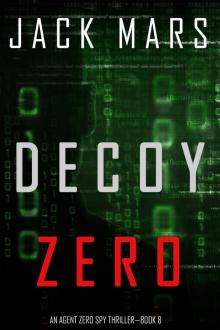 Decoy Zero
Decoy Zero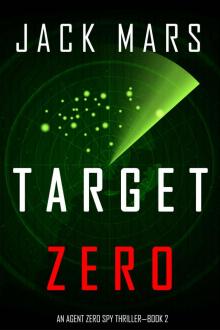 Target Zero
Target Zero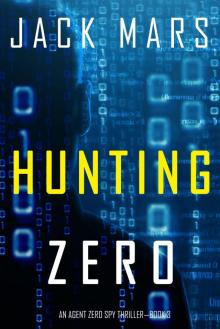 Hunting Zero
Hunting Zero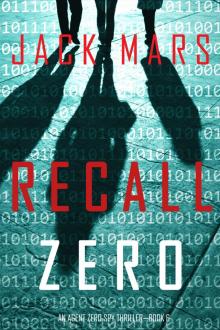 Recall Zero
Recall Zero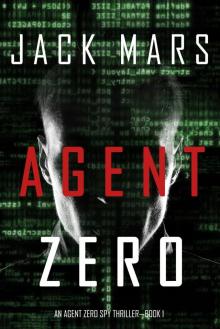 Agent Zero
Agent Zero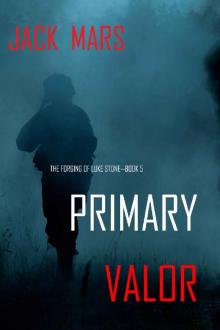 Primary Valor
Primary Valor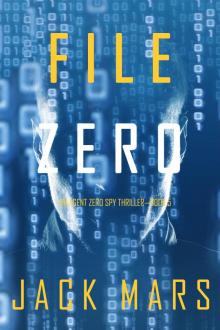 File Zero
File Zero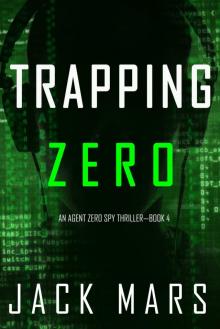 Trapping Zero
Trapping Zero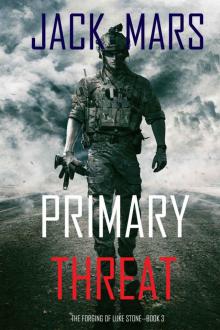 Primary Threat
Primary Threat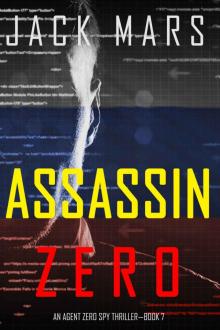 Assassin Zero
Assassin Zero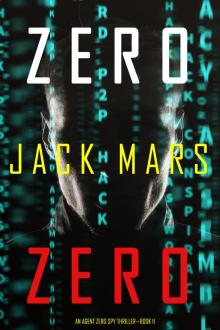 Zero Zero
Zero Zero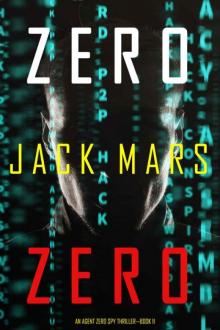 Zero Zero (An Agent Zero Spy Thriller—Book #11)
Zero Zero (An Agent Zero Spy Thriller—Book #11)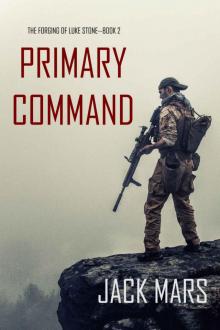 Primary Command
Primary Command![[Luke Stone 02.0] Oath of Office Read online](http://i1.bookreadfree.com/i/03/21/luke_stone_02_0_oath_of_office_preview.jpg) [Luke Stone 02.0] Oath of Office
[Luke Stone 02.0] Oath of Office House Divided
House Divided Oath of Office (a Luke Stone Thriller—Book #2)
Oath of Office (a Luke Stone Thriller—Book #2) Our Sacred Honor (A Luke Stone Thriller—Book 6)
Our Sacred Honor (A Luke Stone Thriller—Book 6)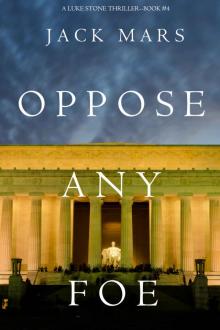 Luke Stone 04 - Oppose Any Foe
Luke Stone 04 - Oppose Any Foe Our Sacred Honor
Our Sacred Honor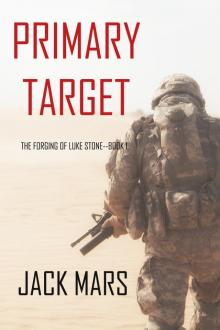 Primary Target
Primary Target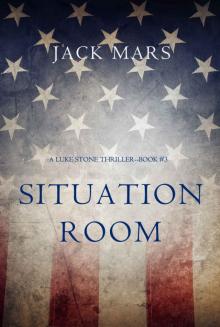 Luke Stone 03 - Situation Room
Luke Stone 03 - Situation Room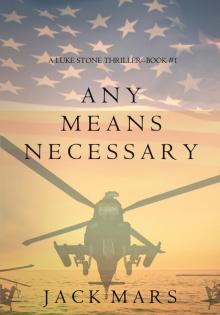 Any Means Necessary: A Luke Stone Thriller (Book 1)
Any Means Necessary: A Luke Stone Thriller (Book 1) Oath of Office
Oath of Office